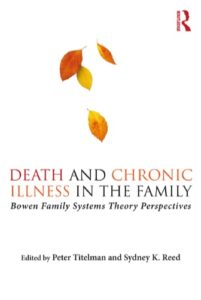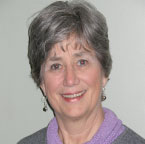Prior to publishing the book Death and Chronic Illness in the Family: Bowen Family Systems Theory Perspectives, Clare Ashworth, acquisitions editor at Routledge, interviewed the book’s co-editors, Sydney Reed and Peter Titelman.

Clare: Can you tell us about the history of this book and what inspired you to write and edit it?
Sydney: Four years ago, I approached Peter with a title, Family Reaction to Death (later renamed Death and Chronic Illness in the Family), for his 6th book. I felt that the Bowen theory perspective on the emotional process in the whole family at a time of heightened anxiety such as a death, diagnosis of a serious illness, or a chronic illness was a view that wasn’t present in much of the mental health, pastoral care or the medical communities. Bowen theory provides a broader understanding of the grief response, and it also helps individuals and professionals track the sources of anxiety in the family that might lead to symptoms in an individual after an important loss. Peter said he would take the project on if I agreed to co-edit the collection.
Clare: Why did you choose to root the book in Murray Bowen’s family systems theory?
Peter: We chose to write our book on death and chronic illness within the approach to Bowen’s family systems theory in contrast to many books that describe the individual’s experience of chronic illness or death. Death and chronic illness are the most significant nodal events that can shake the equilibrium of the family as an emotional unit. The levels of chronic anxiety, stress, and differentiation of self (maturity) of the individuals in the family as well as for the family as a whole, play a large part in the way families—nuclear and extended—manage death along a continuum of emotional stability in the family.
Clare: What does it mean to be “present and accounted for” when a family member is facing illness or death?
Sydney: Being present and accounted for means showing up for important family events such as funerals, weddings, holidays. It also means staying in relationship with the ill person or family members who are anxious and upset by what is happening. At times of heightened stress, family members are a bit more open, although more emotional, providing the opportunity to make a more personal and meaningful connection. Watching the emotional process in the family is instructive regarding the patterns in the family of which one is a member.
Clare: What makes some individuals or families more resilient when responding to chronic illness and death, than others?
Peter: The two most important variables that impact the multigenerational family emotional system are the levels of chronic anxiety and the differentiation of self in the family along the human continuum.
Clare: Can you tell us a little bit about the contributors involved and the variety of perspectives they bring to the book?
Sydney: The contributors to this book come from a variety of professions: social work, nursing, ministry, and psychiatry. All have been trained in Bowen Family Systems theory and bring their own clinical experience and perspective to the specific cases that they report.
Clare: Could you share a couple of ideas with us that will be useful for professionals working with families facing chronic illness or the death of a family member?
Peter: Bowen’s approach is to accept mortality directly and hopefully the physician, psychologist, or other mental health clinicians will find this useful. Bowen was among the first in psychiatry and medicine to address chronic illness and his patients who were dying. He wrote:
“An ‘open’ relationship system is one in which an individual is free to communicate a high percentage of inner thoughts, feelings and fantasies to another who can reciprocate. No one ever has a completely open relationship with another, but it is a healthy state when a person can have a relationship in which a reasonable degree of openness is possible… The ‘closed’ communication system is an automatic emotional reflex to protect self from the anxiety in the other person, though most people say they avoid the taboo subject to keep from upsetting the other person…This is the point at which a trained professional can function as a third person to work the magic of family therapy toward opening a closed system’’. (Bowen, 1978, Family Therapy in Clinical Practice p.322)
We hope the clinicians reading the book will take away the approach of the “open relationship system” between the clinician, the patient, and the family.
Clare: To sum up the book in one sentence
Sydney: These chapters by Bowen family theory professionals provide guidelines to follow in order to manage oneself in a way that allows for an optimum family outcome by staying connected to other members without becoming reactive to the behaviors of conflict, distance, blame and the need to fix others that often are activated by death and/or chronic illness.
Sydney Reed’s keynote presentation at the upcoming CFC Winter Conference, Clinical Applications of Bowen Family Systems Theory: 21st Annual Day of Workshops on February 22, 2019 will cover ideas from the book Death and Chronic Illness in the Family.





Leave a Reply